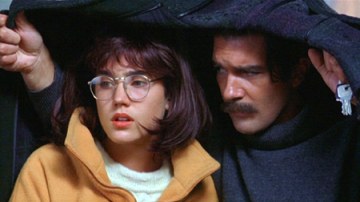|
Scoop's notes in yellow: These international co-productions are irritating. The Spanish speakers all have different accents. Connelly, who doesn't speak Spanish, came up with yet another accent. I don't know if anyone sounded like a Chilean. I think some of the minor roles were actually spoken in Spanish, then dubbed into English, making everything sound hollow and artificial. You know you're in trouble when you have an English-language movie in which Antonio Banderas is the anchor of the acting troupe. Jennifer Connelly's acting skills have traveled a great distance in the past years, allowing her to turn in credible, even award-winning, performances in A Beautiful Mind and Requiem for a Dream. Back in 1994, however, she was only at the beginning of that journey. But I never saw her look more beautiful. Tuna hit all the highs and lows. I don't like historical trivializations in the first place, the whole school of "oh, that darned Hitler, he really messed up my love life", so you can imagine I wasn't thrilled with a story that used fascist tortures as a backdrop for a silly Harlequin Romance. Add to that the problem that the direction in this film is primitive. There are useless shots, scenes seem to end at the wrong time, and the transitions between the scenes are clumsy, all of which makes a fairly straightforward plot seem confusing. I did learn so much, though. I learned that the privileged classes can find human rights abuses to be, in their own way, almost as important as fashion. |
||||||
|
Connelly and Banderas escape from the
fascists in their convincing false identities (right).
Note the glasses and moustache, which caused the evil generalissimos to wave them through. Both studied at the Bobby Valentine School of Disguise. |
|
||||
|
||||||

